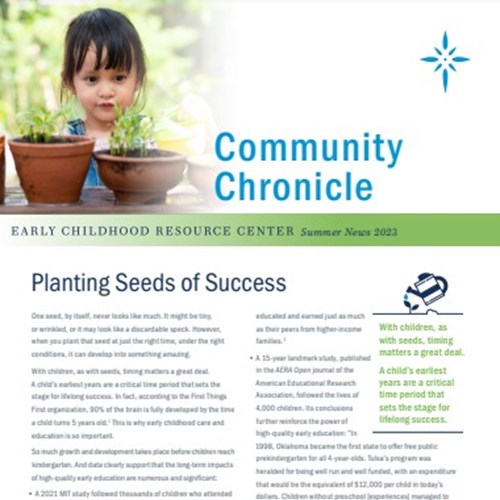Early Childhood Resource Center helps child care centers build sustainable business models

The pandemic placed enormous strain on child care centers. Even before the pandemic, most centers were operating with razor-thin profit margins. The Early Childhood Resource Center launched the Business Operations & Staffing Solutions (BOSS) project to equip child care administrators with the knowledge, tools, and strategies they need to build sustainable business models. Since September, a group of nearly 20 child care administrators have been involved in the project.
The BOSS project is highlighted in the center's most recent Community Chronicle newsletter, along with an article about the importance of high-quality early education, SPARK success stories, a recap of a foster care expo the center co-hosted and news updates.
The text of the BOSS article is below. The full newsletter is available here.
The Early Childhood Resource Center, which is a ministry of the Sisters of Charity Health System, works to promote the healthy development of young children by strengthening families, improving the quality of early learning experiences, increasing school and community readiness, and informing public policy.
The BOSS Project: It’s Just Good Business
It’s no secret that the pandemic placed enormous strain on child care centers. Even before the pandemic, most centers were operating with razor-thin profit margins. In its 2021 report entitled The Economics of Child Care Supply in the United States, the U.S. Department of the Treasury frames the problem by stating, “The child care sector is a crucial and underfunded part of the American economy.”
Even in the best of times, shrewd operational strategies can determine whether a business is sustainable or ultimately closes.
Our Business Operations & Staffing Solutions (BOSS) project equips child care administrators with the knowledge, tools, and strategies they need to build sustainable business models. Since September, a group of around 20 child care administrators has been working with our early childhood specialists to learn about developing operating polices, forecasting finances, recruiting and retaining staff, and working toward financial sustainability. Nationally recognized consultant and author Karen Foster-Jorgensen has been teaching the administrators to analyze their financial statements and create business plans, and local consultant Mark Plaster has helped the cohort address staffing challenges and engage employees.
Tammy Maffei, director of Latchkey Kids in Norton, says participating in the BOSS program has helped her tremendously. Latchkey Kids provides before- and afterschool care. The center had been charging
on an hourly basis; however, working with Karen Foster-Jorgensen helped Tammy understand that transitioning to a perday rate would strengthen her finances significantly. In fact, the analyses she conducted through the BOSS project helped Tammy pinpoint several changes to further enhance the center’s bottom line. Additionally, she learned concrete strategies for creating a positive work environment and handling staff conflict, both of which are critical elements of staff retention.
Through the BOSS project, Tammy has come to value the benefits of using Procare software, which offers a suite of business automation functions specifically for child care centers. She had begun using Procare a year before participating in BOSS, but Procare is extensive and requires a steep learning curve. The BOSS coaching Tammy received from the Early Childhood Resource Center helped her learn to use the software efficiently. But that’s not all. Tammy also benefited from networking with other BOSS project participants. All administrators wear so many hats. Connecting with others in similar roles helped Tammy see that she wasn’t the only one experiencing certain challenges.
For example, before Marcia Ruse participated in BOSS, she found financial tasks to be quite time consuming. As the director of Bazetta Christian Childcare Center in Cortland, Marcia was hoping to maximize operational efficiency. As she states, “Every Tuesday, I would have to prepare an invoice for each child, print the invoice out, and place the invoice in parent mailboxes. Every Monday, I would collect the checks out of our drop-box and proceed to process tuition payments. I would make copies of the checks and drive to the bank to make a deposit. At the end of December, I would run a report and type out letters for parents filing income tax. It was timeconsuming and a nightmare.”
With support from Early Childhood Resource Center staff and Procare representatives, Marcia, too, began using Procare software to streamline operations. Marcia was thrilled with the results, as were her staff and families. “Parents were excited that they could make payments from their cell phones. Teachers [can now] do lesson plans and child assessments online. Finally, the hours I spent on invoices, receiving payments, scheduling, and payroll have been reduced tremendously. I would recommend implementing Procare in any child care center.”
With strategies gained through the BOSS project and continued coaching and support from the Early Childhood Resource Center, these centers will now be able to serve families for as long as they are needed.
- Sisters of Charity Health System
- News Releases
- St. Vincent Charity Health Campus
- Light of Hearts Villa
- Regina Health Center
- Sisters of Charity Foundation of Canton
- Sisters of Charity Foundation of Cleveland
- Sisters of Charity Foundation of South Carolina
- Building Healthy Communities
- Catholic Community Connection
- Early Childhood Resource Center
- Healthy Learners
- Joseph and Mary's Home
- South Carolina Center for Fathers and Families